 Petzlover
Petzlover Australian Stumpy Tail Cattle Dog is originated from Australia but Dandie Dinmont Terrier is originated from United Kingdom. Australian Stumpy Tail Cattle Dog may grow 23 cm / 10 inches higher than Dandie Dinmont Terrier. Australian Stumpy Tail Cattle Dog may weigh 12 kg / 27 pounds more than Dandie Dinmont Terrier. Both Australian Stumpy Tail Cattle Dog and Dandie Dinmont Terrier has same life span. Both Australian Stumpy Tail Cattle Dog and Dandie Dinmont Terrier has same litter size. Both Australian Stumpy Tail Cattle Dog and Dandie Dinmont Terrier requires Moderate Maintenance.
Australian Stumpy Tail Cattle Dog is originated from Australia but Dandie Dinmont Terrier is originated from United Kingdom. Australian Stumpy Tail Cattle Dog may grow 23 cm / 10 inches higher than Dandie Dinmont Terrier. Australian Stumpy Tail Cattle Dog may weigh 12 kg / 27 pounds more than Dandie Dinmont Terrier. Both Australian Stumpy Tail Cattle Dog and Dandie Dinmont Terrier has same life span. Both Australian Stumpy Tail Cattle Dog and Dandie Dinmont Terrier has same litter size. Both Australian Stumpy Tail Cattle Dog and Dandie Dinmont Terrier requires Moderate Maintenance.
 There is quite a bit of mystery surrounding the origin of the Stumpy Tail Cattle Dog. The breed was developed as a working dog to herd sheep and cattle, but there are quite a few theories about the development of the breed. It is agreed however, that the dog was developed in Australia and came about from crossing the Australian Dingo and British herding dogs.
There is quite a bit of mystery surrounding the origin of the Stumpy Tail Cattle Dog. The breed was developed as a working dog to herd sheep and cattle, but there are quite a few theories about the development of the breed. It is agreed however, that the dog was developed in Australia and came about from crossing the Australian Dingo and British herding dogs.
Perhaps the most popular theory for the origin of the Australian Stumpy Tail Cattle Dog is that the breed was developed by a man named Timmins, sheep drover and a cattle operating in New South Wales during the colonial period. Whatever the dog’s origins, it was in 1996 that the United Kennel Club, the 2nd largest dog registry in the world and the United States, granted full recognition to the Stumpy Tail Cattle Dog as a member of the Herding Group. The breed’s name was changed to the Australian Stumpy Tail Cattle Dog in 2002. Today he remains almost exclusively a tail-less working dog.
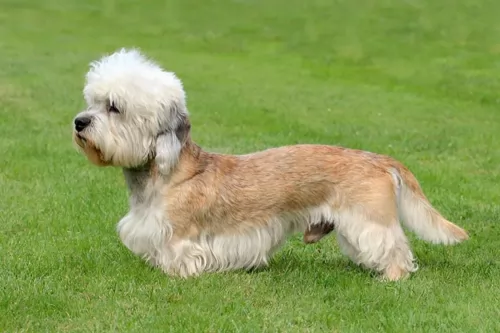 The rough coated Dandie Dinmont Terrier originates from Scotland. They were used centuries ago for hunting otters and badgers.
The rough coated Dandie Dinmont Terrier originates from Scotland. They were used centuries ago for hunting otters and badgers.
There are theories that exist that the dog is a cross between Scottish- and Skye Terriers while others believe there must be some Dachshund in the mix because of the long body of the Dandie Dinmont Terrier.
The Dandie Dinmont Terrier was first recorded as a distinct breed in the late 1600s. The British Dandie Dinmont Terrier Club was formed in 1875 while the American Kennel Club recognized the Dandie in 1886.
 An interesting fact about the Australian Stumpy Tail Cattle Dog is that he is naturally tail-less so no tail docking has been required for this naturally bobtailed dog. He is medium-sized to large-sized with his most distinctive feature being the lack of a tail. The coat of the dog is short to medium length, dense and straight. Another interesting aspect is that the coat color is a speckled blue or speckled red.
An interesting fact about the Australian Stumpy Tail Cattle Dog is that he is naturally tail-less so no tail docking has been required for this naturally bobtailed dog. He is medium-sized to large-sized with his most distinctive feature being the lack of a tail. The coat of the dog is short to medium length, dense and straight. Another interesting aspect is that the coat color is a speckled blue or speckled red.
Height of the dog is 46–51 centimetres at the withers the dog is normally squarely proportioned with long legs and pricked ears. The dog has no exaggerated features and what you see is what you get – a plain, hard-working dog which is fit and muscular. He is equally long from chest to rump as he is from the ground to the shoulder.
The muzzle of the dog is of average length, but fairly broad and the nose is always black. The dog is intelligent, alert and also mischievous and he makes a good pet. With proper socialization, he’ll get on well with children they know and who treat them with kindness. He is alert and makes a very good watchdog, being fairly territorial.
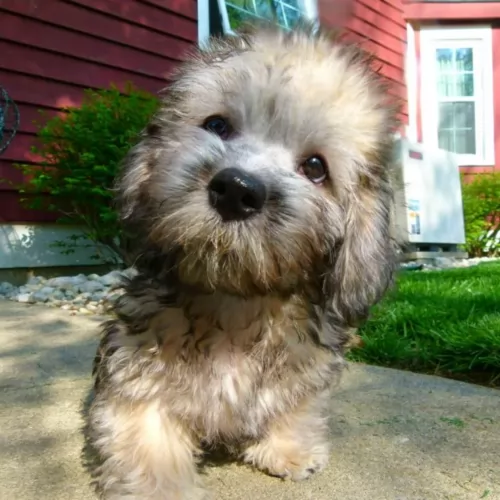 The Dandie Dinmont Terrier is a small dog who stands between 20 – 28cm at the withers and weighs between 8 and 11kg. He is recognizable by his fluffy head of hair.
The Dandie Dinmont Terrier is a small dog who stands between 20 – 28cm at the withers and weighs between 8 and 11kg. He is recognizable by his fluffy head of hair.
He actually has quite a unique look with his long body and slightly over-sized head. He has floppy ears and a long tail. His coat is quite unusual too in that it can be silky and long around the face, legs and belly, while the topcoat is fairly shortish and crisp. His coat color is fawn to brown or reddish. He isn’t a heavy shedder.
Known also as the Dandie, Charlie’s Hope Terrier, the Mustard and Pepper Terrier, the Dandie Dinmont makes an excellent family pet with his calm demeanor, being somewhat reserved around strangers.
He is an alert, intelligent little dog and will warn you of strangers coming into your space. He therefore makes a good watchdog. He is loving and loyal to his human family and will readily fit into life in the city or in the countryside.
They are good with children and pets but with his independent streak, he will require training and socialization if you want him to behave and be obedient.
 The Australian Stumpy Tail Cattle Dog is a hardy dog, capable of hardships that would take its toll on other dog breeds. He is a wonderful athlete and if you’ve got him working with your livestock, he’ll tirelessly perform his duties – small wonder he is so valued in the Australian cattle industry.
The Australian Stumpy Tail Cattle Dog is a hardy dog, capable of hardships that would take its toll on other dog breeds. He is a wonderful athlete and if you’ve got him working with your livestock, he’ll tirelessly perform his duties – small wonder he is so valued in the Australian cattle industry.
If you’re looking for a robust breed who will have all the energy needed to accompany you on all your adventures, he won’t disappoint. He is amazingly capable and always willing.
He’s a family dog and will be loving, devoted and loyal. Care should be taken with him around small children and other pets as he’s not to comfortable around them and he doesn’t tolerate strangers too well either. Train him and socialize him and you’ll have an amazing friend for life.
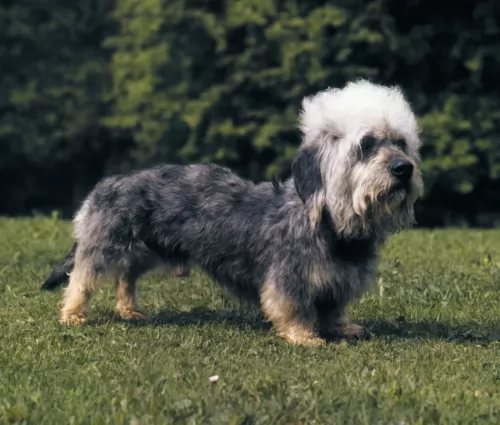 Your Dandie Dinmont is capable of being a wonderful companion. He loves spending time with his human family and is affectionate and loyal.
Your Dandie Dinmont is capable of being a wonderful companion. He loves spending time with his human family and is affectionate and loyal.
The small Dandie is able to fit into life in the city or country, just so long as he has his human family with him. Because he comes from Terrier dogs, he is no push-over though and he has an independent streak which will benefit from training and socialization.
Make sure you give this small dog of yours plenty of love and good care and you will find that you have a loyal, devoted friend in him.
 The Australian Stumpy Tail Cattle Dog is regarded as being an extremely healthy breed, and the average life expectancy of this breed is at least 14 to 15 years and older.
The Australian Stumpy Tail Cattle Dog is regarded as being an extremely healthy breed, and the average life expectancy of this breed is at least 14 to 15 years and older.
They don’t suffer with many genetically inherited conditions, but they are susceptible to
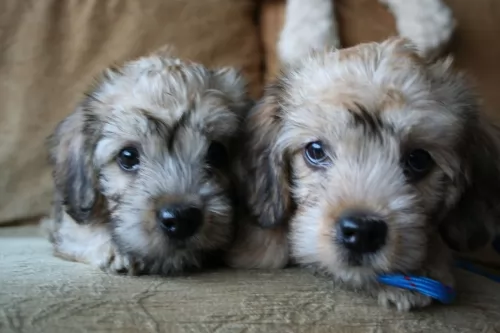 Your pet Dandie Dinmont is a robust little dog who, with good care, can live to be anything between 12 to 15 years of age.
Your pet Dandie Dinmont is a robust little dog who, with good care, can live to be anything between 12 to 15 years of age.
With every dog breed there will be health concerns, and these can include illnesses such as epilepsy as well as hypochondroplasia. All dogs have the potential to fall prey to health problems, and getting your pet from a reputable breeder can help to ensure you eliminate some of these diseases.
This small dog has a long body which means he can be affected by spinal problems. Genetics and body shape play a large role. Intervertebral disc disease is a condition where the cushioning discs between the vertebrae of the spinal column herniate into the spinal cord space. The discs press on the nerves and pain and paralysis can follow.
 The beauty about the Australian Stumpy Tail Cattle Dog is that he is low to moderate maintenance. He will require a good weekly brushing as he can shed quite a bit when the season’s change and his new coat comes in. He is hypoallergenic.
The beauty about the Australian Stumpy Tail Cattle Dog is that he is low to moderate maintenance. He will require a good weekly brushing as he can shed quite a bit when the season’s change and his new coat comes in. He is hypoallergenic.
Australian Stumpy Tail Cattle Dog puppies will need 4 bowls of food over a 24 hour period Puppies from 6 months on can have 2 bowls a day. Speak to your vet about the best foods for your dog and ensure fresh, cool water is constantly available to your pet.
Don’t just feed your dog pellets continuously – mix in some raw meat and some cooked chicken and rice for variety and to ensure a shiny, glossy coat.
The Stumpy is a hugely energetic dog and he will become bored and frustrated if he doesn’t get plenty of exercise and games. Ball throwing, swimming, long walks and a run in the park will be important for the Stumpy that doesn’t live on a farm. Leaving him alone without exercise will lead to anti-social behaviour such as continuous barking, digging and chewing.
Take your Stumpy to the vet if you suspect health problems. Certainly, when you buy a puppy, make sure that he has all his vaccinations. There are certain health problems that are more common in the Australian Cattle dog and you want to do whatever it takes to ensure your dog steers clear of them.
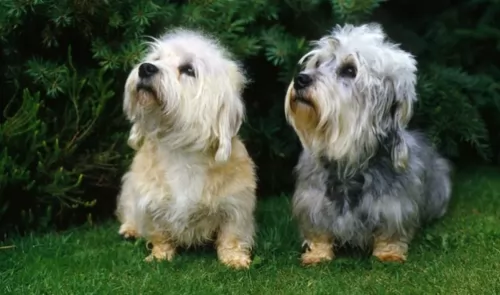 The Dandie doesn’t require as much exercise as some other dog breeds but you want to make sure he goes with you on your walks, or you play ball with him in the garden. You don’t want to see a small dog like this becoming obese as it can herald in a host of health problems.
The Dandie doesn’t require as much exercise as some other dog breeds but you want to make sure he goes with you on your walks, or you play ball with him in the garden. You don’t want to see a small dog like this becoming obese as it can herald in a host of health problems.
The Dandie Dinmont Terrier doesn’t shed a hang of a lot but still, you will need to brush him twice a week to get rid of those loose hairs. Also, the coat will require stripping twice a year. Some dog owners who prefer a low maintenance breed might not like knowing this, but it is a necessary part of his grooming. There are some dog owners who cut the hair rather, but then the texture of the coat will change. This is only important to know if you want to show your Dandie. Other Dandie owners take their pets to a professional groomer for clipping.
Because the Dandie has floppy ears and a lot of hair around the face and ears, you will need to check his ears for dirt and wax build-up as these can cause an ear infection. If you’re nervous to be going inside your dog’s ears, the vet or the dog groomer can show you how.
Also, little dogs like this are prone to tooth decay, and you will need to brush his teeth 2 or 3 times a week. This is because plaque and tartar buildup can cause mouth infections which contribute to other diseases within the body.